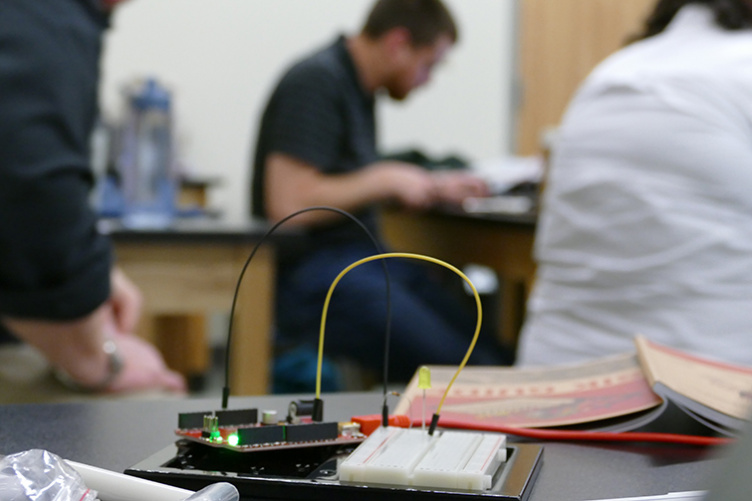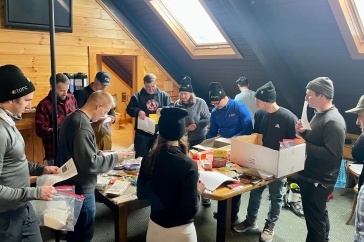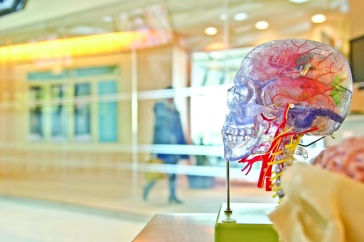
A workshop in progress at the STEM Educators Summit
Adrien Deshaies is helping his students push limits and approach science in unconventional ways. A science and robotics teacher at Belmont High School in New Hampshire, he attended the second annual STEM Educators Summit for approaches and tools that will inspire his students to think outside the box, think critically and challenge ideas. Deshaies’ goal is for his students not just to experience the study of science and robotics, but to contribute to it.
UNH Today: Please tell me about your background as an educator.
Adrien Deshaies: After earning a bachelor’s degree in meteorology from Plymouth State University in 2009, I jumped straight into a master’s program for science education and immediately found my niche. I love all of the Earth sciences and find them fascinating, however K-12 education in large part doesn't do them justice, especially at the high school level). High school programs lack the math and integration of various technologies to truly help kids develop an understanding of how the abiotic environment functions.
Today, to understand complex topics such as weather, climate change, volcanic, tectonic or other geologic systems really requires an understanding of data — big data. These fields are in large part based on our ability to process and utilize enormous quantities of data that are continuously being collected and archived. Recognition of patterns and understanding of probability are essential to understanding the processes that drive these systems.
UNH Today: What techniques have you used to bring STEM instruction to your students?
Deshaies: STEM represents an integration of skills that depend on each other. What students struggle to understand is that it is the integration of these skills that gives them the ability to think independently and critically — which creates more opportunities for success.
As a teacher I can only help them develop these skills, to meet them where they are and show them how to build on what they know through application. I find the best way to do this is through development of a progression, whether it is statistical in nature, or working with them to help them utilize technologies ranging from data loggers to learning an entire programming language to become more efficient in collecting/analyzing those data needed to support or even refute an argument.
UNH Today: Why do you think a STEM focus is needed now, versus in the past?
Deshaies: I think a STEM focus has always been needed. I think the problem is there were too many communication breakdowns between all of the stakeholders involved initially. We didn't understand how to articulate what was needed. At first, inquiry was supposed to address it but lacked concrete language/expectations.
Since then, the idea of practice and STEM have taken over with much better results. Even today, as much as we are focused on providing better education and opportunities for our youth, we continually fall short. There are many stakeholders who are doing amazing things, but we still struggle to connect with the volume of students needed to address deficiencies within our own workforce. Many STEM programs in schools, including the most successful, are continually underfunded and under-supported. Still, in five years alone we have come a long way.
UNH Today: Why do you think events like the STEM Educators Summit are important?
Deshaies: I have attended great workshops the last two years. This year, I came for the micro controllers. I know I can integrate these into my robotics and Earth science programs at school. Students can use them to program and act as the "brain" to their robot, or they can learn to build their own data loggers from scratch to automate a process for data collection that would give them a higher resolution of data needed to better understand a natural process.
For me, attending the workshop is the first step in integrating their use into the classroom; however, all the best ideas I've had over the years have come from conversations with other attendees.
UNH Today: What were the major takeaways from the summit for you, and how will they influence your work?
Deshaies: It's an opportunity to take a step back and enjoy myself. It provides motivation and fuels creativity. I also enjoy the interaction among peers. I think this will always be my biggest takeaway.
The first annual STEM Educators Summit was made possible by the UNH STEM Teachers Collaborative. Its goal is to offer high-quality professional development workshops for K-12 educators as well as networking opportunities.
-
Written By:
Sarah Schaier | College of Life Sciences and Agriculture



















































